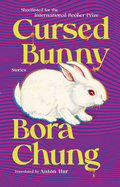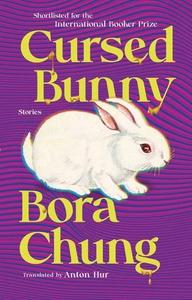
 Cursed Bunny, the English-language debut by South Korean writer and translator Bora Chung, is a thought-provoking and blood-soaked collection of 10 short stories, ranging in genre from horror to science fiction. In "The Head," a woman is disgusted to find a creature made of her own defecation forming in her toilet, who seems determined not to leave her alone. In the titular "Cursed Bunny," a cursed bunny lamp wreaks havoc on a corrupt CEO and, much more tragically, on his innocent son. In "Ruler of the Winds and Sands," a goodhearted princess faces a supposed villain only to learn that true evil actually resides closer to home. Finally, in what is perhaps the collection's most haunting story, "Snare," a man consumed by greed encourages his own children to feed on each other to produce gold-infused blood that he can sell to the highest bidder.
Cursed Bunny, the English-language debut by South Korean writer and translator Bora Chung, is a thought-provoking and blood-soaked collection of 10 short stories, ranging in genre from horror to science fiction. In "The Head," a woman is disgusted to find a creature made of her own defecation forming in her toilet, who seems determined not to leave her alone. In the titular "Cursed Bunny," a cursed bunny lamp wreaks havoc on a corrupt CEO and, much more tragically, on his innocent son. In "Ruler of the Winds and Sands," a goodhearted princess faces a supposed villain only to learn that true evil actually resides closer to home. Finally, in what is perhaps the collection's most haunting story, "Snare," a man consumed by greed encourages his own children to feed on each other to produce gold-infused blood that he can sell to the highest bidder.
From the start, Cursed Bunny refuses to blink in the face of even the most gruesome or disturbing images. Rather than producing such images just for shock value, however, each story mobilizes its grotesquerie to reveal the viscerally disturbing underbelly of patriarchal capitalist systems that produce a shiny exterior. "Snare," perhaps the most literalized metaphor of this kind, is written in clear-eyed and unflinching prose that evokes fables and Grimm fairy tales alike, using the form to produce a moral message about those who see the accumulation of wealth as paramount. The main character's prolonged process of bleeding out first a fox and then his own children, however, is tense and horrifying enough for the reader to get lost inside the story's world, instead of hovering above to see its abstract messaging.
Even in stories such as "Snare" or "Cursed Bunny," the other most explicit capitalist cautionary tale, there is a multifaceted dimension to these surreal and unsettling plots that manages to evade easy reading or overly simplistic messages. The frame narrator's involvement in the "Cursed Bunny" tale, for example, suggests a generational reproduction and collective implication in its primary evil that gestures beyond a straightforward reading. And in stories like "The Head," "The Embodiment" and "Goodbye, My Love," the overlapping ideologies of sexism, capitalism, optimization and classism--among others--become a complex puzzle box. Instead of being merely intellectual metaphors, Bora Chung's stories succeed at being deeply visceral experiences that do what the best fairy tales do: convey the unspeakable in a way that is nevertheless collectively understood. --Alice Martin, freelance writer and editor
Shelf Talker: Cursed Bunny is a collection of unsettling but transformative stories that blend fairy tale, horror and speculative fiction, perfect for fans of Bong Joon-ho's films or Helen Oyeyemi's fiction.

